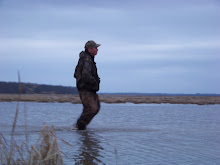"Optimism"
You see, the only certainty about hunting is its inherent uncertainty. All too often, the only things we carry out of the woods are the guns and gear we toted in and, hopefully, a few memories. I don’t know the percentages, but I can attest that an overwhelming number of treks into the woods end with the pick-up truck bed’s being as empty as it was when it pulled up to the gate before the hunt.
Therefore, a healthy – if not unrealistic – amount of optimism is crucial in order to make it through a several-month-long season with your mental health intact. Each hunter has his or her own particular way of seeing the bright side in order to press on, only so much of which is based on actual fact or science.
Take, for instance, any number of times you and a friend have been driving up to deer camp on a Friday afternoon. How many times has he gazed out the window at a cow pasture blurring by and offered, “The cows are up on their feet. That’s a good sign.”? Forget the fact that cows have hooves and not feet; your friend’s observation is fueled by unadulterated optimism: because one random herd of cattle happens to be up and feeding, therefore all the deer will be up and feeding, too. That’s good stuff. Hit the gas.
Then there are cold fronts. I, personally, can find nothing wrong with cold fronts. They usher in seasonal temperatures which are conducive to building a fire, they push ducks southward (a real plus if you’re a Southern duck hunter) and they give deer hunters ample room for optimism. Any time a cold front is bearing down on us, I am fond of saying things like, “Now’s the time to be in the woods. The deer are going to be up and moving in advance of this front.” And inevitably, once the front has passed and the winds have died down, I’ll follow that up with, “Anybody who’s in the woods today is going to kill deer. They’ve been laid up waiting on this front to pass through and should be moving all day.”
Now, I don’t know whether deer movement and feeding times are really affected by cold fronts and other weather phenomena. All I know is that on occasion, I have seen deer up and moving about on either side of a cold front. The thing that enables me to extrapolate my mere hypothesis into immutable fact without the first shred of proof and in flagrant violation of all known scientific protocol, is, in a word, optimism.
When it comes to the glass being half-full, turkey hunters epitomize the ideal. In fact, there may exist no more optimistic lot than turkey hunters (or masochistic, for that matter). If we turkey hunters weren’t the-glass-is-half-full kind of folks, we wouldn’t be capable of getting out of bed long before sunup for forty-five mornings in a row just to pursue what is unquestionably the toughest and most formidable quarry in the woods. Separate and apart from the sheer difficulty of hunting wild turkeys, the hunter is prone to get frostbitten when the season opens and snake bitten by the time it closes; he’s likely to log a hundred-or-so miles on his snake boots; and runs a real risk of realizing zero return on his investment by season’s end. Were we able to bottle and sell a turkey hunter’s optimism, we’d be able to cure depression around the globe by lunch time.
Duck hunting is a little different than turkey hunting. With turkey hunting, you know the gobblers are out there: you’ve seen their tracks; you’ve found their droppings; you can hear them gobble. Coaxing one into gun range, however, is quite another matter, or, as lawyers put it, the ultimate issue. Duck hunters, on the other hand, don’t always know whether they’ll have ducks or not. If you don’t get enough rain, you won’t see any ducks. Too much rain, and the ducks will be so spread out you may not see any. And if there’s a freeze, the ducks will be one or two states south of you by the time you buckle your waders.
One thing this proud turkey hunter will readily admit is that duck hunters work harder than anyone else in the woods or on the water. I’ve been duck hunting enough to not only have gained immense respect for die-hard duck hunters, but to know that I’d have a hard time getting through an entire season under the best of conditions; I cannot imagine slogging my way through a bad season. Like turkey hunters, duck hunters insist on hunting every day, rain or shine, good or bad, feast or famine. The level of optimism required of duck hunters must be extraordinary to get them through seventy-something days in the duck blind.
A grueling duck season, a frustrating spring in the turkey woods and a shutout in the deer stand can dishearten the upbeat, and positively grind to a pulp the pessimistic. Like strong camp house coffee and plastic-wrapped pastries, our optimism keeps us going, especially in times when the ledger shows far more red ink than black.
(c) Roger Guilian 2011


<< Home